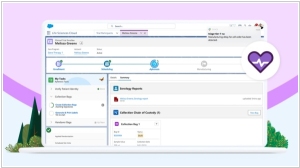Jitsi vs Zoom
June 13, 2023 | Author: Adam Levine
Jitsi and Zoom are both popular video conferencing platforms, but they have distinct differences in their features, privacy considerations, and target audiences. Jitsi is an open-source video conferencing solution that offers features such as video and audio calling, screen sharing, chat, and recording. It is known for its privacy-focused approach, offering end-to-end encryption and the ability to host meetings on a self-hosted server for added control over data. Jitsi is suitable for individuals and organizations that prioritize privacy, open-source solutions, and customization options.
Zoom, on the other hand, is a widely used video conferencing platform that offers features such as video and audio conferencing, screen sharing, chat, virtual backgrounds, and recording. It provides a user-friendly interface, reliable performance, and a range of collaboration tools. Zoom is well-suited for businesses, educational institutions, and individuals looking for a comprehensive and easy-to-use video conferencing solution with features optimized for seamless remote collaboration.
See also: Top 10 Video Calling apps
Zoom, on the other hand, is a widely used video conferencing platform that offers features such as video and audio conferencing, screen sharing, chat, virtual backgrounds, and recording. It provides a user-friendly interface, reliable performance, and a range of collaboration tools. Zoom is well-suited for businesses, educational institutions, and individuals looking for a comprehensive and easy-to-use video conferencing solution with features optimized for seamless remote collaboration.
See also: Top 10 Video Calling apps
Jitsi vs Zoom in our news:
2024. Zoom unveils all-in-one AI work platform for more than just video conferencing
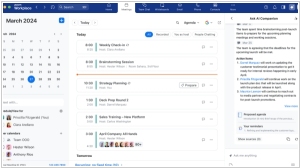
The unveiling of Zoom Workplace by a leading video conferencing company introduces an innovative "AI-powered collaborative platform" integrating its AI virtual assistant alongside a suite of novel features aimed at enhancing team productivity. Leveraging its existing AI Companion, Zoom Workplace streamlines meeting organization and summarization tasks, empowering users with its Ask AI Companion function to effectively prepare for and review meetings by aggregating and analyzing data from various Zoom applications such as Meetings, Mail, Team Chat, Notes, and Docs. Notably, the platform seamlessly integrates with third-party applications like Microsoft 365 and Google Workspace, further broadening its functionality and utility for users.
2024. Zoom debuts its app for Vision Pro, featuring digital personas, 3D files and more

Zoom has unveiled its visionOS app designed specifically for Apple's Vision Pro. This innovative application introduces various features including "persona" support, enabling users to utilize a digital avatar during calls, and 3D object sharing through the "Team Chat" feature, among others. Apple's Persona feature captures a user's face scan, providing a spatial representation of themselves within Vision Pro, and Zoom's dedicated app seamlessly incorporates this, allowing participants to observe facial and hand movements during meetings. Additionally, Zoom on Vision Pro leverages the headset's augmented reality (AR) technology, presenting video calls as floating windows that blend seamlessly with the user's physical space. The visionOS apps' three-dimensional interface facilitates the sharing of 3D files, bringing objects to life in the user's environment. While 3D object sharing will not be available at the initial launch, Zoom has announced plans to roll out this feature later in the spring.
2023. Zoom launches online document editor Zoom Docs
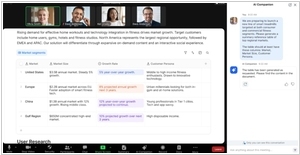
Zoom has unveiled a new product called Zoom Docs, which is a flexible and modular AI-powered workspace designed specifically to tackle the challenges of today's hybrid work environment. This innovative tool enables teams to not only create documents but also develop wikis and manage workflows seamlessly, all within the Zoom platform. Zoom Docs offers modularity, user-friendly interface, and adaptability. It seamlessly integrates with both Zoom and third-party applications, simplifying the process for teams and individuals to collaborate, create, manage projects, and stay organized. Moreover, Zoom Docs incorporates Zoom AI, allowing users to populate documents with content from Zoom Meetings, facilitating informed and efficient content creation. Additionally, the built-in Zoom AI Companion assists in generating compelling plans and projects based on previous discussions, enhancing productivity and creativity.
2023. Zoom launches an asynchronous video tool for the meeting-averse
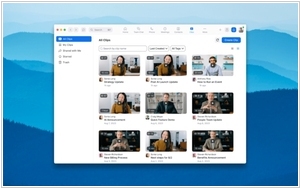
Zoom has introduced a new asynchronous video tool called Zoom Clips. It enables users to record, edit, and share video clips without the need for a live meeting. Currently in public beta, Zoom Clips offers a dedicated content library where users can efficiently manage, share, rename, search for, download, or delete their clips. Accessible through the desktop Zoom app, the Zoom web portal, as well as the Mac menu bar and Windows system tray, Clips allows users to capture both screen and webcam feeds, optionally with a virtual background, or specific portions of their desktop. After recording, users can enhance their clips by adding a title, description, and tags, trimming unwanted sections, and sharing via email through Zoom's web portal. Additionally, users can control access to the clip, specifying whether it is viewable by anyone with the link or only within their organization, and they can monitor comments and metrics such as completion rate and views from the same portal.
2023. Zoom partners with Anthropic to bring Claude chatbot to Zoom products

With the increasing prominence of generative AI, Zoom has recognized the importance of partnering with Language Model (LLM) companies to navigate the evolving AI landscape. In line with this strategy, Zoom has recently announced its collaboration with Anthropic, a partnership that will involve leveraging Anthropic's Claude chatbot on the Zoom platform, initially focusing on the Zoom Contact Center. The objective of this partnership is to enhance customer support by providing more accurate responses while minimizing instances where the models generate fictional answers in the absence of the correct response. Zoom plans to continue collaborating with the Anthropic model and gain a deeper understanding of its workings. Eventually, the intention is to incorporate this technology into other Zoom products. It is important to note that there is currently no specific timeline for the introduction of Anthropic-based functionality to the market. However, Zoom remains committed to ongoing development in this area.
2023. Zoom acquires employee communications platform Workvivo

Zoom has announced its intention to purchase Workvivo, an Irish startup that has been operating for six years with a focus on enhancing internal communication and culture within businesses. Unlike Zoom and other similar communication tools, Workvivo places a greater emphasis on asynchronous communication rather than real-time communication. Its platform is designed to promote employee engagement on a broader level, offering features such as an activity feed, people directory, surveys, and a channel for important company announcements, similar to a modern intranet. Workvivo has gained a notable customer base since its establishment in Cork in 2017, with companies such as Amazon, RyanAir, and Bupa among its clients.
2023. Zoom announces AI features that act as your personal assistant
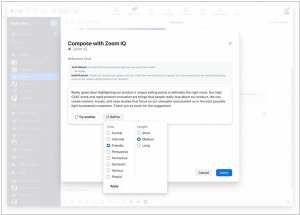
Video conferencing provider Zoom announced new additions to its AI-powered tool Zoom IQ. The new features leverage OpenAI's Large Language Model, or LLM, to summarize meetings, generate recaps, and draft chat and email responses. On the heels of announcements from Microsoft, Google, and Slack, Zoom is the latest major productivity tool to get the AI treatment. Zoom IQ already uses AI to give users meeting information through chapters, highlights from recordings, and action items. But it is taking it a step further by integrating OpenAI's powerful generative AI model. If you're late to a meeting, Zoom IQ can summarize in real time what you've missed and ask questions for you. Using text prompts, it can generate brainstorms using Zoom's whiteboard tool.
2023. Zoom is adding new features to compete with Slack, Calendly, Google and Microsoft
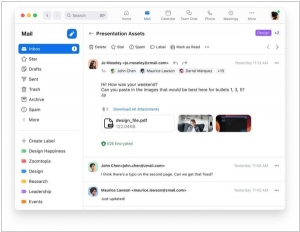
Zoom is expanding its offerings to compete with a range of companies, including Slack, Calendly, Google, and Microsoft, by introducing new features such as AI-powered meeting summaries, prompt-based email responses, and whiteboard generation, in addition to video "Huddles" and a meeting scheduler. Zoom aims to encourage users to shift more of their work tasks to its platform, and as such, it is making its email and calendar clients available to everyone. The company had been testing these tools since last year as part of a broader push beyond meetings. Furthermore, Zoom is offering hosted email and calendar services with end-to-end encryption protection and custom domains for paid users, which could serve as an alternative to Microsoft Exchange and Google Workspace for businesses.
2022. Zoom dives deeper into intelligent customer service with Solvvy acquisition
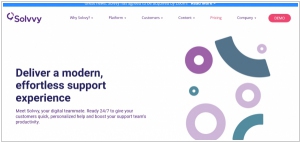
In the previous year, Zoom expressed interest in acquiring Five9 as a means to enter the customer service domain. Although the deal eventually fell through, Zoom's determination to establish a presence in customer service remained unwavering. Earlier this year, the company unveiled a new customer service solution, leveraging its existing capabilities to provide an integrated customer service experience within the Zoom toolset. Building upon this foundation, Zoom has recently announced its intention to acquire Solvvy, a nine-year-old startup specializing in conversational AI. By incorporating Solvvy's technology, Zoom will gain enhanced automation and intelligence, enabling the resolution of routine queries without human intervention.
2022. Zoom announces Zoom Whiteboard, gesture recognition among several updates
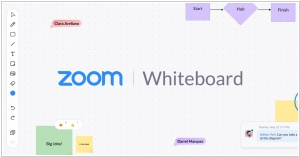
Zoom has recently announced a range of updates and new features, including the introduction of a virtual whiteboard and gesture recognition. One notable update is Zoom IQ for Sales, an AI-powered feature that analyzes calls to provide valuable insights. Additionally, Zoom has implemented Gesture Recognition, allowing users to raise a hand or give a thumbs up during a call instead of clicking on a reaction button. Currently, this feature supports only these two gestures and requires the client version 5.10.3 or later. By default, Gesture Recognition is disabled at the client level, but it can be enabled at the account, user, or individual level.




